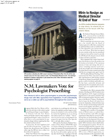Acupuncture, a common treatment for cocaine dependence, is no more effective than a nontargeted needle insertion or relaxation control in reducing cocaine use, according to a large new study by researchers at Columbia University’s National Center for Addiction and Substance Abuse (CASA) and Yale University School of Medicine.
“The recommendation would be that acupuncture not be used by itself as a treatment for addiction or in a setting where there is only minimal counseling or therapy,” said lead author Arthur Margolin, Ph.D., a research scientist at Yale Medical School, in a statement accompanying the release of the study findings. “I don’t think this trial shows that acupuncture is ineffective across the board,” he added.
Margolin collaborated with principal investigator Herbert Kleber, M.D., a professor of psychiatry at Columbia.
According to the National Acupuncture Detoxification Association (NADA), more than 500 clinical sites in the United States and Europe currently use acupuncture protocols developed by researchers at the Lincoln Medical and Mental Health Center in the Bronx and then adopted by the NADA. Acupuncture needles are inserted into four specific acupuncture zones in the ear that are thought to be stimulatory points for the sympathetic nervous system, the liver, the lungs, and what is referred to in Chinese medicine as “shen men.”
Earlier studies of the use of acupuncture in cocaine treatment have been mixed; however, a report from a smaller trial conducted at Yale last year found the therapy to be effective in helping some people to reduce their reliance on cocaine. Other studies have indicated that acupuncture as part of cocaine treatment may have a calming effect on patients, decrease craving for the drug, and promote retention of patients in psychosocial treatment.
The current report, which appeared in the January 2 Journal of the American Medical Association, looked at 620 cocaine-dependent adult patients. Of these, about two-thirds used cocaine only, and the remaining third used both opiates (mostly heroin) and cocaine and were in methadone maintenance.
Patients were randomly assigned to receive auricular acupuncture following the protocols of the NADA, a needle-insertion control condition, or a relaxation control condition. Treatments were given five times a week for eight weeks, and drug counseling was also offered to all patients in each of the three arms of the study.
The work was funded through grants from the National Institute on Drug Abuse and the Conrad Hilton Foundation.
Of the 620 subjects who began the study, nearly half dropped out prior to completing the eight-week protocol.
Cocaine use was measured during treatment and at three- and six-month post-randomization follow-up visits, based on urine drug screens.
Urine samples showed a significant overall reduction in cocaine use, but no difference between the three conditions. In addition, no difference was noted for drop-out rates between the three conditions of the study.
Counseling sessions in all three conditions were poorly attended.
Although the authors noted that the study did not confirm their initial hypothesis that acupuncture would be effective in treating cocaine addiction (based on Margolin’s previous smaller study at Yale), the results are consistent with findings from another large-scale controlled clinical trial of acupuncture for cocaine addiction in residential and day treatment settings. In that study, which appeared in the January 1999 issue of the Journal of Substance Abuse Treatment, the investigators also found no difference between the NADA protocol and concurrent controls.
Margolin said the findings were certainly unexpected, but noted that it is not unusual to have successive trials of similar treatments that present different findings.
“But to go from a fairly strong finding for acupuncture to no finding at all was surprising,” he said in a press release.
While this study was intended to look at the benefits of acupuncture as a stand-alone treatment in cocaine addiction, the authors cautioned that more research is needed to look at the contribution of acupuncture when used as a part of a comprehensive cocaine-addiction treatment program.
